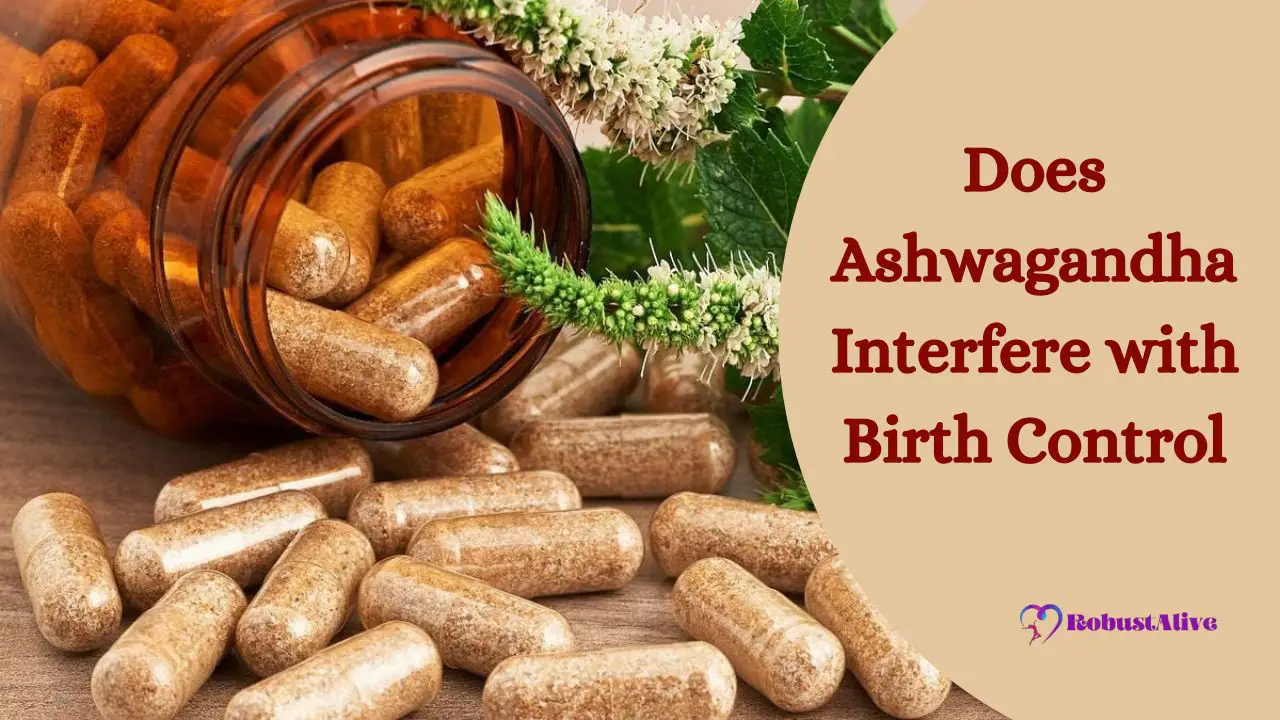Does Ashwagandha Interfere with Birth Control?

There are several uses for the plant ashwagandha’s root in Ayurvedic medicine. This includes treating conditions including anxiety, balance, and asthma and boosting a person’s libido and chances of becoming pregnant.
Are you intrigued to know does Ashwagandha interfere with birth control?
Well, the answer is no. You can take Ashwagandha while using contraception. However, pregnant women shouldn’t do so since it may cause early labor. There is still room for trial-based evidence to prove how Ashwagandha interacts with contraceptive methods. According to available study and people’s experiences, it is obvious that Ashwagandha and birth control goes hand in hand.
This age-old Indian herb has won the heart of many fitness enthusiasts around the globe. Keep reading to know its’s connection to birth control, fertility, and how this plant can benefit or affect human health.
Does Ashwagandha Interfere with Birth Control?
The herb ashwagandha is known to have various benefits for human health. People have utilized this herb for many years in conventional Ayurvedic therapy. It is frequently used to increase general well-being and lessen stress due to its well-known adaptogenic qualities.
As of right now, there is no solid scientific proof that ashwagandha negatively affects the effectiveness of hormonal birth control methods. It doesn’t affect oral contraceptives, patches, or hormonal intrauterine devices (IUDs).
Researchers didn’t really do many trials to study the interference of Ashwagandha and birth control. The majority of the studies that are available concentrate on the herb’s broader benefits rather than how it affects birth control.
According to Katie Pande, a medical herbalist with Pukka Herbs, ashwagandha may be used safely with contraceptives. She also adds it increases low libido levels.
To be safe, we suggest our readers take doctor’s advice before using any herbal supplements, including ashwagandha, with prescription drugs like birth control.
This precaution is important for a number of reasons:
Interaction with Other Drugs
Certain drugs and ashwagandha may interact, causing changes in the way they are absorbed, metabolized, or eliminated from the body. Despite the fact that there is no concrete proof of interactions between ashwagandha and birth control, it is good to take professional advice on this.
Person-to-Person Variations
The way that a person’s body responds to supplements and drugs might vary. Some people could have certain sensitivities or metabolic variations that might affect how well their birth control works. A medical expert can evaluate your particular situation and offer tailored guidance.
Effects of Ashwagandha on Hormones
According to research, ashwagandha has hormonal effects. It could alter cortisol levels, which might indirectly affect the body’s other hormonal systems. But there is no concrete proof that ashwagandha alters the hormonal equilibrium required for birth control to function properly.
Does Ashwagandha Affect IUD?
There is quite a buzz on social media platforms that Ashwagandha may interact with birth control methods, including IUDs. But there isn’t any research-based information to support these claims.
Different brands and producers may produce different quality and potency ashwagandha supplements. Try to select reliable sources and adhere to dose recommendations.
Can Ashwagandha Increase Fertility?
Ashwagandha benefits the reproductive system, libido, and menstrual periods by lowering cortisol levels, increasing blood production and flow, and reducing bodily stress. Research has shown Ashwagandha to increase fertility.
The qualities of Ashwagandha are particularly helpful in maintaining reproductive organ health and hormone balance in the body. Consuming Ashwagandha is said to be particularly beneficial for the issue of female infertility.
Ashwagandha contains a sufficient quantity of iron. Iron insufficiency is a common cause of infertility in women. Ashwagandha usage is really beneficial in this circumstance.
Mental health problems might also contribute to the infertility issue. Regularly taking Ashwagandha has various advantages for enhancing mental wellness.
Taking ashwagandha is said to be highly helpful in treating male infertility as well. Consuming ashwagandha raises your body’s testosterone levels, which boosts your fertility. In addition, consuming ashwagandha is thought to be particularly beneficial for raising the body’s amount of luteinizing hormone.
In Ayurveda, Ashwagandha is regarded as a panacea due to its therapeutic qualities. Consuming this has a significant positive impact on sperm production. Additionally, it is thought that Ashwagandha’s characteristics might improve sperm quality. After consulting a doctor or other specialist, you can put Ashwagandha in your diet if you’re having trouble conceiving.
A variety of biological, hormonal, and behavioral variables all have an impact on fertility, which is a complicated and multifaceted issue. Ashwagandha probably won’t have a big effect on reproductive results by itself. You need to take a holistic approach, which involves living a healthy lifestyle and taking medical assistance.
What Are The Benefits of Taking Ashwagandha?
More than 300 participants in a Pukka Herbs study discussed the benefits of ashwagandha. The ability to participate in social activities increased by 42%, and ashwagandha also has the added advantage of supporting and bolstering our overworked adrenals.
Here are some benefits of Ashwagandha:
- Ashwagandha is widely known for its adaptogenic qualities, which may aid in improving how effectively the body handles stress and fostering general well-being.
- Traditional uses of ashwagandha include treating symptoms of stress and anxiety and maybe promoting mental wellness.
- According to certain research, ashwagandha may assist in enhancing sleep quality and support good sleep habits.
- Memory, concentration, and attention are just a few of the cognitive functions that ashwagandha may help with.
- Ashwagandha promotes physical vitality and energy levels, assisting in the fight against weariness.
- By strengthening the immune system, ashwagandha may improve the body’s resistance to disease and infection.
- There are anti-inflammatory substances in ashwagandha, which may help to lessen inflammation in the body.
- Antioxidants found in ashwagandha can lessen cellular damage brought on by free radicals and fight oxidative stress.
- By controlling stress, Ashwagandha helps to manage a healthy weight.
What Are The Side Effects of Taking Ashwagandha?
This herb is said to be appreciated by celebrities including Meghan Markle, Emily Weiss, Jennifer Aniston, and a growing list of other names in the spotlight. But does it have any side effects? Let’s find it out:
- Ashwagandha is reported to boost thyroid hormone concentrations. Hence, persons with hyperthyroidism may encounter unwanted symptoms.
- Ashwagandha extract is proven to strengthen the immune system. This aspect may be a concern for persons diagnosed with autoimmune illnesses, such as rheumatoid arthritis, lupus, and multiple sclerosis.
- This herb can be for people suffering from stomach ulcers. It can irritate their gastrointestinal tract.
- Some people reported experiencing constipation, and others had diarhea.
- It can make you feel drowsy or sleepy. Make sure you don’t combine the plant with benzodiazepines like lorazepam, zolpidem, or alprazolam. Despite the paucity of studies on herb-drug interactions, vigilance must be used.
- Ashwagandha has immunostimulatory properties, which may cause the rejection of a kidney allograft. As a result, patients thinking contemplating a kidney transplant should speak with their physician.
- You must stop taking ashwagandha at least two weeks before any impending procedure that will need anesthesia to prevent any possible medication interactions.
Frequently Asked Questions (FAQs)
-
Can Pregnant Lady Take Ashwagandha?
No, the FDA has labeled it “unsafe” and advises against consumption by expectant mothers. There is some evidence to suggest that while Ashwagandha may promote fertility, it is also linked to miscarriages.
The appropriate response varies from person to person since there hasn’t been enough research done to provide a definitive answer. Avoid this for the duration of your pregnancy.
-
Does Ashwagandha Really Increase Sperm Count?
Yes, it does. It helps men with infertility issues produce more sperm. To evaluate this claim, experts have done a large number of scientific investigations. After taking Ashwagandha for three months, men’s sperm concentration increased by 167%, according to research.
-
Is Ashwagandha Good for Uterus?
Yes, Ashwagandha does, in fact, assist in regulating female hormones. According to research, it aids in restoring normal thyroid hormone and blood cortisol levels. It even controls reproductive hormones to relieve PCOS and menstrual cramps.
Bottom Line
Ashwagandha has a solid reputation for relaxing nerves and assisting individuals who are nervous and upset. If you were taking Ashwagandha and had this thought does ashwagandha interfere with birth control, then you got clarity that it doesn’t. This traditional form of Ayurvedic medicine improves fertility and positively affects reproductive hormones.
Though it has so many health advantages, we simply can’t ignore the potential risk factors in the form of side effects. So, before joining the bandwagon of new-age Ashwagandha supporters, don’t forget to consult a doctor.






